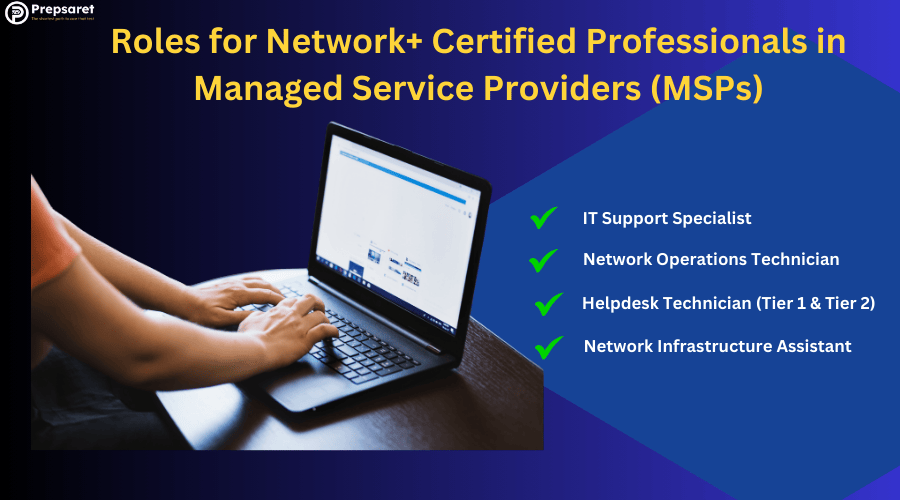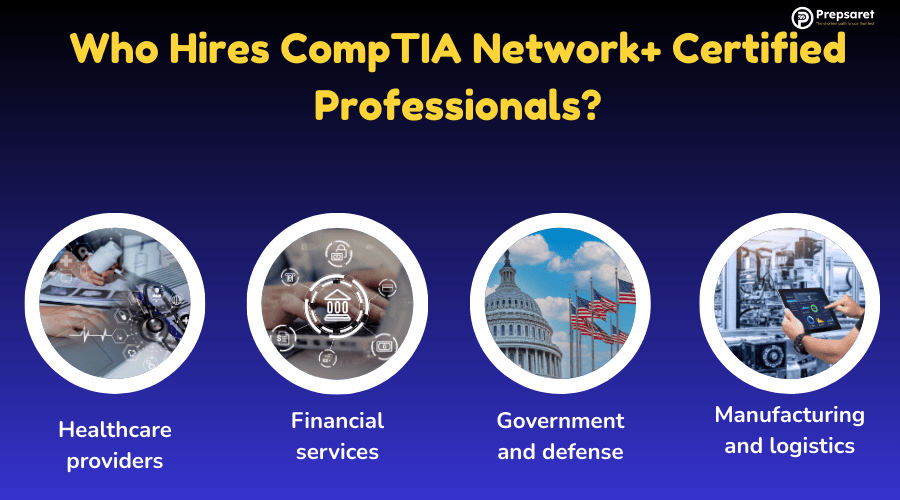Industries Hiring CompTIA Network+ Certified Professionals
Thinking about getting your CompTIA Network+ certification? Great choice. In today’s fast-paced, tech-powered world, this certification isn’t just another resume booster — it’s your passport into some of the most exciting, fast-growing industries out there.
As we move through 2025, companies across the globe are racing to strengthen their digital infrastructure.
From cloud computing to smart cities, everything runs on networks — and those networks need skilled pros to build, secure, and support them. That’s where Network+ certification job opportunities by industry become essential.
Whether you’re looking for CompTIA Network+ jobs near me or aiming to go global, your skills are in demand.
In this article, we’re breaking down exactly which industries are hiring CompTIA Network+ certified professionals right now. Spoiler alert: It’s not just tech companies. Whether you love gadgets, green energy, or helping people solve IT issues, there’s a place for you. Let’s dive in.
Why CompTIA Network+ Certification Is Valued Across Industries
If you’re wondering what makes CompTIA Network+ so special, here’s the scoop:
Network+ is a globally recognized, vendor-neutral certification that proves you’ve got the core skills to manage, troubleshoot, and secure networks — regardless of the platform.
It covers essentials like IP addressing, network security, and infrastructure — things every business needs, whether they sell sneakers or satellites.
And because it’s not tied to one specific brand, CompTIA Network+ career paths by industry are incredibly broad.
These flexible, transferable skills translate smoothly across systems and sectors — which is why so many employers are hiring certified candidates even for CompTIA Network+ jobs with no experience.
Related blog post: Is CompTIA Network+ Worth It for Beginners?
Top Industries Hiring CompTIA Network+ Certified Professionals in 2025
So who’s on the lookout for certified network rockstars? Pretty much everyone.
The digital world is expanding fast, and that means more devices, more connections, and a lot more work to keep everything running smoothly.
With remote work, cloud migration, and automation booming, employers are snapping up CompTIA Network+ remote jobs talent to keep systems connected, secure, and fast.
Whether you’re into cutting-edge tech or just want a stable job with great growth potential, these in-demand sectors for CompTIA Network+ are calling your name.
Emerging Sectors Adopting Network+ Skills for Infrastructure Expansion
Let’s start with the innovative industries that are growing fast and need smart network minds to build them:
- Internet of Things (IoT): Think smart homes, smart factories, smart everything. These devices rely on tight networks to talk to each other. Network+ certified pros help set up those connections and keep them safe.
- Smart Cities: Cities are using tech to manage traffic, energy, waste, and more. It all runs on complex networks that need skilled hands behind the scenes.
- Renewable Energy: Solar, wind, and hydro energy systems are powered by connected sensors and data hubs. Network+ certification job opportunities by industry like this are expanding quickly.
- Cloud-First Startups: Startups born in the cloud are growing fast. They need people who can spin up secure, scalable networks from Day 1.
Why they need you: These sectors need help setting up networks, solving connection issues, keeping data safe, and supporting tech-driven growth. That’s where your Network+ certification skills shine.
Information Technology (IT) Services: A Core Employer of Network+ Talent
Of course, we can’t talk about networking jobs without mentioning the IT services world. This industry has always been a major employer for Network+ certified pros — and it’s still booming in 2025.
Why? Because everything digital — from cloud storage to helpdesk support — depends on solid network infrastructure. Wondering “what jobs can I get with Network+ and security skills?” IT services is a great place to start.
Key Employers & Roles in IT Services
Here are the main players looking for CompTIA Network+ certified candidates:
- Managed Service Providers (MSPs)
- IT consulting firms
- Cloud service providers
- Cybersecurity firms
Common roles include:
- Network Administrator
- IT Support Technician
- Network Analyst
- Junior Network Engineer
Basically, if a company keeps networks up and running for clients — they want you on their team.
Many CompTIA Network+ jobs no experience required start here, often with competitive entry-level salaries.
If you’re wondering about CompTIA Network+ jobs no experience salary, expect ranges around $45,000–$60,000 depending on region and role, with opportunities for rapid growth.
Learn more: How to Start Studying for CompTIA Network+
Roles for Network+ Certified Professionals in Managed Service Providers (MSPs)

Let’s zoom in on MSPs for a second. These companies provide outsourced IT services to businesses that don’t have in-house IT staff. And guess what? They love hiring Network+ certified folks, even those just getting started.
Don’t be surprised if you see “Can you get a job with just CompTIA Network+ reddit” threads filled with success stories in MSPs.
MSPs help many types of clients, from small shops to big corporations. That means variety, fast-paced learning, and tons of opportunities to grow your skills — especially in entry-level roles.
Common Job Titles in MSPs
- IT Support Specialist – You’re the first line of defense when networks act up.
- Network Operations Technician – Monitor and maintain systems to keep things running 24/7.
- Helpdesk Technician (Tier 1 & Tier 2) – Help users troubleshoot and solve issues, from passwords to printer problems.
- Network Infrastructure Assistant – Work alongside engineers to install and upgrade networks.
Bonus: These roles often lead to higher-level positions like Network Engineer, Systems Administrator, or Security Analyst — some of the best jobs with CompTIA Network+ certification.
Who Hires CompTIA Network+ Certified Professionals?

You’ll find CompTIA Network+ certified professionals in all kinds of organizations — not just IT firms. So if you’re wondering who hires CompTIA Network+ certified professionals or what jobs can I get with network reddit-style, the answer is: way more than you think.
Here are some top industries for Network+ certification holders:
- Financial services
- Healthcare providers
- Retail corporations
- Government and defense
- Education and higher ed
- Manufacturing and logistics
- Telecommunications
- Media and entertainment
Each of these industries relies on secure, scalable, and reliable networks. That’s where CompTIA Network+ certified pros shine brightest — building and maintaining the digital backbone of modern business.
Read on: CompTIA Network+ Exam Prerequisites
Government and Defense: High Demand for Network Security and Infrastructure Skills
Government and defense jobs aren’t just about boots on the ground—they’re also about bytes in the cloud. These sectors rely on rock-solid networks to protect data, support critical operations, and maintain secure communication lines.
Here’s the kicker: many federal jobs require certifications like Network+ as part of their hiring process (we’re looking at you, DoD 8570).
Why Network+ Is a Perfect Fit
The CompTIA Network+ cert isn’t just a résumé booster—it’s a launchpad for roles that demand top-notch security and infrastructure skills.
Whether it’s setting up secure communications for troops or safeguarding classified systems, Network+ gives you the knowledge to stay compliant, connected, and protected.
You’ll be ready for:
- Network defense roles
- Secure communications work
- Supporting compliance with government cybersecurity standards
Network+ for Government Jobs
If you’re looking to land entry-level jobs with CompTIA Network+ or climb the ladder to more senior roles, Network+ certification is highly valued.
Many government jobs require this certification as a baseline, especially in cybersecurity and IT infrastructure, with Network support technician roles being some of the most common.
Understanding how to stay compliant with cybersecurity mandates is crucial, and Network+ provides a comprehensive foundation for these needs.
Check this out: CompTIA Network+ + Free Questions
Healthcare Industry Needs Certified Networking Specialists for Secure Data Handling
Healthcare has gone digital. From electronic health records to telemedicine, the need for secure and reliable networks is absolutely critical.
That’s where you come in. If you’re Network+ certified, healthcare organizations want you on their tech team.
Who’s Hiring?
Everywhere you turn in the healthcare world, someone needs networking help:
- Hospitals and urgent care clinics
- Health insurance companies
- Electronic Health Record (EHR) vendors
- Medical research centers
Hot job titles include:
- Health IT Specialist
- Network Support Technician
- IT Help Desk for EHR Systems
Why HIPAA Compliance Drives the Need for Networking Expertise
Let’s talk HIPAA (the Health Insurance Portability and Accountability Act). This U.S. law makes sure patient data is kept private and secure. But without solid networking knowledge, HIPAA compliance falls apart.
How Network+ Pros Help with HIPAA:
- Set up secure, encrypted networks
- Support HIPAA-approved data transfer methods
- Lock down systems to prevent breaches and unauthorized access
Bottom line: No secure network = no HIPAA compliance. Your skills can make or break patient data protection.
Network+ in Healthcare IT
Network+ certified professionals are crucial in healthcare IT, helping to maintain and secure networks within hospitals and clinics.
If you’re pursuing a career in this field, Network+ for cybersecurity roles will make you an attractive candidate. Healthcare relies on secure systems, and CompTIA Network+ in healthcare IT is integral for meeting regulatory standards.
Finance and Banking Rely on Network+ Certified Professionals for Network Reliability
Banks and financial services move millions (sometimes billions) of dollars daily. That kind of activity requires fast, stable, and hacker-proof networks—and that’s where Network+ certified pros shine.
Who’s Hiring in Finance?
You’ll find opportunities at:
- National and community banks
- Credit unions
- Online financial platforms
- Investment firms
In-demand job roles:
- Network Security Analyst
- Network Operations Center (NOC) Technician
- Banking Systems Support Engineer
Cybersecurity-Driven Networking Demands in Financial Services
Cybercriminals love targeting banks. From phishing attacks to ransomware threats, the financial industry needs a nonstop digital defense squad.
Your Network+ Skills in Action:
- Set up secure networks that prevent intrusion
- Monitor traffic for suspicious activity
- Troubleshoot vulnerabilities before hackers find them
- Help meet industry-specific compliance requirements like PCI DSS
In short: You’ll be the silent guardian of financial data, helping customers and institutions sleep easier at night.
Network+ Certification Salary by Industry
The Network+ certification salary by industry varies, but the financial sector is known to offer some of the highest-paying positions for those with CompTIA Network+. As the demand for network security grows, so does the potential for career advancement in this field.
Telecommunications Companies Employ Network+ Certified Techs for Network Operations

If you’ve ever made a phone call, streamed a movie, or sent a text, you’ve got telecom techs to thank. Behind every connection, there’s a team making sure networks stay strong, fast, and secure.
Telecommunications companies depend on skilled workers to build, maintain, and troubleshoot their complex network systems. This is where Network+ certified professionals come in.
Roles and Responsibilities
Here are some cool jobs Network+ can help you land in telecom:
- Field Network Technician – You’re out and about, installing network equipment, troubleshooting connections, and making sure everything works smoothly in the field.
- Line Installer and Repairer – Whether it’s copper or fiber, you’re the one climbing poles or digging underground to lay the lines that keep people connected.
- Central Office Technician – Think of this role as the hub master—maintaining big systems in a central location to manage network traffic.
- Cable and Fiber Optics Support – You’ll work with high-speed cables that keep modern internet running at lightning speed.
Why Network+ is Relevant
So, why does Network+ certification matter here?
- It teaches both wired and wireless networking fundamentals, which are the bread and butter of telecom work.
- It gets you ready for real-world tasks like setting up routers, switches, and dealing with those “uh-oh” moments when a network goes down.
Telecom Careers with Network+
Telecom is booming, and telecom careers with Network+ continue to grow, with positions ranging from field technicians to network analysts.
The Network+ job market in telecommunications shows strong growth as the demand for high-speed networks rises worldwide.
Continue reading: Best Study Resources for CompTIA Network+
Manufacturing and Industrial Sectors Use Network+ Skills for IoT and Automation
Let’s take a trip to the factory of the future. Picture machines that talk to each other, robots that know when to restock, and sensors that predict problems before they happen.
Sounds like sci-fi? Nope—it’s called Industry 4.0, and it’s happening now.
Behind all this tech magic is a need for strong, secure networks. That’s where Network+ certified professionals shine.
Use Cases in the Field
With Network+ skills, you could be helping manufacturers with things like:
- IoT Device Networking in Smart Factories – Connect and manage sensors, smart devices, and machines.
- Remote Monitoring and Predictive Maintenance – Keep tabs on equipment from afar and stop breakdowns before they happen.
- Machine-to-Machine (M2M) Communication Setup – Set up seamless talk between automated systems and devices.
Types of Roles
Curious about where you might fit in? Check out these job titles:
- Industrial Network Engineer – You’ll design and maintain networks in factory environments.
- Automation Network Specialist – Make sure all the smart machines are talking to each other the way they should.
- IoT Connectivity Technician – Set up and support connections between thousands of tiny, powerful devices.
Why Network+ is a Smart Move
Your Network+ cert gives you the knowledge to work with both physical and cloud-based networks, which is key in today’s connected manufacturing world.
Plus, it shows employers you’re serious about keeping their tech humming along safely and efficiently.
Manufacturing and CompTIA Network+ roles are rapidly expanding, with opportunities across various sectors as automation and IoT become standard.
Where Can I Work with a Network+ Certification?
The versatility of a Network+ certification means you have options across several industries. Whether you’re looking to work in telecom, finance, government, healthcare, or manufacturing,
Network+ equips you for a wide range of tech roles. Companies across various sectors are seeking professionals with this foundational networking knowledge.
Companies Hiring Network+ Certified Techs
From banking firms to telecom companies to healthcare providers, companies hiring Network+ certified techs are always looking for talent. The demand for skilled network professionals is expected to increase as more industries embrace digital transformation.
Network+ and Cybersecurity Roles
While Network+ is foundational, it also opens doors to cybersecurity roles. As organizations continue to face rising cyber threats, Network+ certified professionals are essential in securing networks and supporting broader cybersecurity efforts.
Network+ Certification Job Trends
The CompTIA Network+ job trends point to continued growth in networking positions, particularly as industries like telecom and manufacturing embrace new technologies like IoT and automation.
Those with Network+ are well-positioned to take advantage of these emerging job markets.
Ready to jump in? Whether you’re searching CompTIA Network+ jobs near me, exploring CompTIA Network+ remote jobs, or researching salary data like CompTIA Network+ jobs salary, know this: your skills are in demand across industries.
If you’re curious about what jobs can I get with network and security, CompTIA Network+ is the perfect launchpad.
Start your journey today and tap into the vast world of Network+ certification job opportunities by industry — the future is wired, and it’s waiting for you.
FAQs
What Jobs Can I Get With Just A CompTIA A+ Certification?
A CompTIA A+ certification qualifies you for entry-level IT positions including help desk technician, technical support specialist, field service technician, service desk analyst, desktop support administrator, end-user computing technician, and system support specialist. These roles typically focus on troubleshooting, maintenance, and basic IT support tasks.
How Much Do CompTIA Network+ Certified People Make?
CompTIA Network+ certified professionals earn an average salary of around $77,078 per year.
Salaries vary by role, experience, and location, with entry-level positions starting lower and experienced network engineers or analysts earning significantly more. Major tech hubs and certain industries may offer higher compensation.
What Is The Most In Demand CompTIA Certification?
The most in-demand CompTIA certification is Security+, followed by A+ and Network+. Security+ is particularly sought after for cybersecurity roles, reflecting the growing emphasis on information security across industries and organizations in 2025.
What Jobs Can I Get With A CompTIA Security+ Certification?
A CompTIA Security+ certification opens doors to roles such as cybersecurity analyst, security consultant, systems administrator, security administrator, security engineer, and network administrator.
It also supports positions like incident responder, vulnerability analyst, penetration tester, and cybersecurity project manager.
Should I Go for Network+ or CCNA?
Choosing between Network+ and CCNA depends on your goals. Network+ is vendor-neutral and ideal for foundational networking knowledge, while CCNA is Cisco-focused and valued for deeper, enterprise-level networking expertise.
CCNA-certified professionals typically earn higher salaries, but Network+ offers broader entry-level opportunities.

